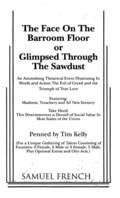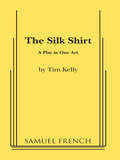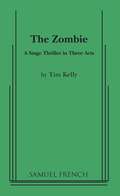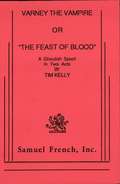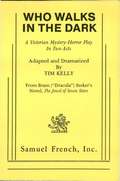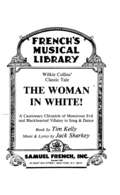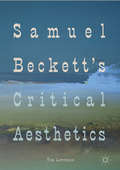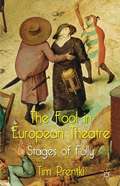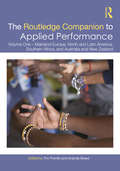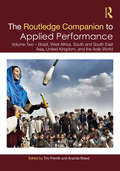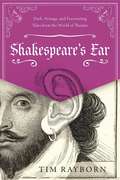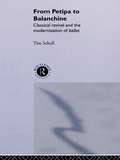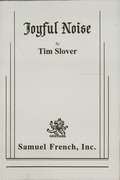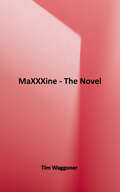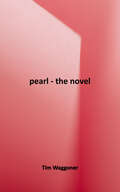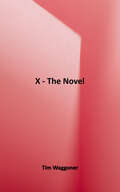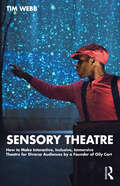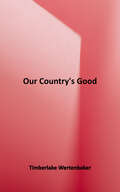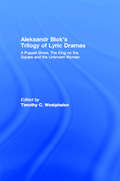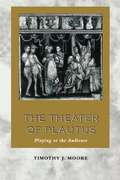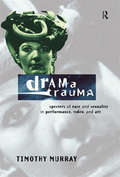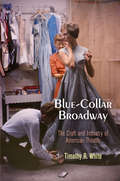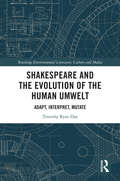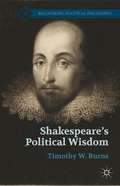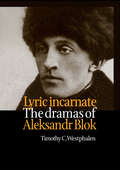- Table View
- List View
The Face on Barroom Floor or "Glimpsed Through the Sawdust"
by Tim KellyMelodrama spoof / 6m, 8f or 5m, 9f, optional extras and Olio Acts / 1 set / Insidious villains endeavor to separate Madelaine Mockingbird, chambermaid turned singer, from the fortune left her by an old miner and from her true love: Jack "Toulouse" Goodhart, painter turned tramp. Extremely simple to stage, The Face on the Barroom Floor features good character parts, hilarious sight gags, throw away lines, zany action, classic vaudeville routines, and some really terrible (and very funny) jokes. Easy rehearsals and no production problems make this a joy to stage.
The Silk Shirt
by Tim KellyDrama / 1m, 3f / Interior / An unemployed young actor and his wife live with his semi invalid mother and shy older sister until something turns up. Their life style conflicts with the mother's. The climax occurs when the wife returns with an expensive silk shirt for a good friend, now blind. The mother's outraged at the wife's extravagance and conflict's renewed until the sister -- understanding human motives -- asserts herself.
The Zombie
by Tim KellyThis is a comedy thriller in a weird and sinister setting the Okefenokee Swamp in Florida where voodoo practices are accepted. In a decayed mansion dripping with cobwebs and mystery, a former carnival hypnotist calling himself Baron Samedi and a crooked sheriff have developed an "unusual" business. They turn illegal immigrants, petty criminals and intruders into zombies and lease them out as farm laborers. Profits and success aren't enough, however. The hypnotist wants revenge against those who have wronged him in the past. Soon the house is shaking with thrills, shivering shocks, and a startling climax. For the young television producer and his two girls friends who stumble onto the grim proceedings, it's a night to remember, especially when they encounter "The Walking Dead". Despite the goosebumps, this chiller is loaded with genuine comedy and keeps its audience in a state of taut excitement and laughter. The roles are fun and production needs are simple.
Varney the Vampire or the Feast of Blood
by Tim KellyMelodrama Spoof / 4m, 8f / Unit set / This wild and clever spoof is based on a melodramatic novel attributed to Thomas Prest, the creator of Sweeney Todd. In 1900 weary vampire Sir Francis Varney shows up at an inn in Italy. He plans to visit a haunted grotto and ask forgiveness from a lost love whose ghost is doomed to roam the landscape wearing a thin veil over her face. Varney forgets his mission and proceeds to snarl and snap at everyone in sight, especially an English damsel. Varney is shot, stabbed with a wooden stake and hanged. Still he survives! The action gets sillier and sillier (and funnier and funnier) as Inspector Balsadella seeks answers for the strange goings on. The tongue in cheek style is a howl, and there are many optional, corny stage effects as well as a zany cast of characters. Ultimately Varney manages to destroy himself.
Who Walks in the Dark: A Victorian Mystery-horror Play In Two Acts
by Tim KellyThriller / 5m, 6f, 1 optional m or f extra / This thrilling jewel is based on Stoker's classic suspense novel written after Dracula. By breaking into the tomb of an evil sorceress, archaeologist Sir Abel Trelawny has upset The Nameless One's plans for a return to the living. She comes to London's Karnak house (in which the play is set) and creates murderous havoc for Sir Abel, his two daughters and his bewildered staff. Comic relief is supplied by a bumbling sergeant who admires Sherlock Holmes. The occult mystery builds to a rousing climax, complete with dramatic twists that hold the audiences spellbound.
Woman In White! (Kelly & Sharkey): A Cautionary Chronicle Of Monstrous Evil And Blackhearted Villiany In Song & Dance
by Tim KellyMusical / 4m, 8f / Sub titled "A Cautionary Chronicle of Monstrous Evil and Black hearted Villainy in Song & Dance", this is a loony musical spoof of Wilkie Collins' grim Gothic novel. Amid murder, madness, betrayal and vile deeds, the music is merry. There are even two fiendish murders set to music! The central character, villainous Sir Percival Glyde, and his cohort in crime Countess Fosco (Proprietor of a madhouse) are two of the vilest-- and funniest-- foul fiends ever set to toe tapping music.
Samuel Beckett's Critical Aesthetics
by Tim LawrenceThis book considers how Samuel Beckett’s critical essays, dialogues and reflections drew together longstanding philosophical discourses about the nature of representation, and fostered crucial, yet overlooked, connections between these discourses and his fiction and poetry. It also pays attention to Beckett’s writing for little-magazines in France from the 1930s to the 1950s, before going on to consider how the style of Beckett’s late prose recalls and develops figures and themes in his critical writing. By providing a long-overdue assessment of Beckett’s work as a critic, this study shows how Beckett developed a new aesthetic in knowing dialogue with ideas including phenomenology, Kandinsky’s theories of abstraction, and avant-garde movements such as Surrealism. This book will be illuminating for students and researchers interested not just in Beckett, but in literary modernism, the avant-garde, European visual culture and philosophy.
The Fool in European Theatre
by Tim PrentkiWhy is folly essential to the functioning of a healthy society? Why is theatre a natural home for madness? The answers take the reader on a journey embracing Shakespeare and Jonson, Brecht and Beckett, B#65533;chner and Boal. From Falstaff to Fo via Figaro, this study examines the art of telling truth to power and surviving long enough to have a laugh.
The Routledge Companion to Applied Performance: Volume One – Mainland Europe, North and Latin America, Southern Africa, and Australia and New Zealand (Routledge Companions)
by Tim Prentki and Ananda BreedThe Routledge Companion to Applied Performance provides an in-depth, far-reaching and provocative consideration of how scholars and artists negotiate the theoretical, historical and practical politics of applied performance, both in the academy and beyond. These volumes offer insights from within and beyond the sphere of English-speaking scholarship, curated by regional experts in applied performance. The reader will gain an understanding of some of the dominant preoccupations of performance in specified regions, enhanced by contextual framing. From the dis(h)arming of the human body through dance in Colombia to clowning with dementia in Australia, via challenges to violent nationalism in the Balkans, transgender performance in Pakistan and resistance rap in Kashmir, the essays, interviews and scripts are eloquent testimony to the courage and hope of people who believe in the power of art to renew the human spirit. Students, academics, practitioners, policy-makers, cultural anthropologists and activists will benefit from the opportunities to forge new networks and develop in-depth comparative research offered by this bold, global project.
The Routledge Companion to Applied Performance: Volume Two – Brazil, West Africa, South and South East Asia, United Kingdom, and the Arab World (Routledge Companions)
by Tim Prentki and Ananda BreedThe Routledge Companion to Applied Performance provides an in-depth, far-reaching and provocative consideration of how scholars and artists negotiate the theoretical, historical and practical politics of applied performance, both in the academy and beyond. These volumes offer insights from within and beyond the sphere of English-speaking scholarship, curated by regional experts in applied performance. The reader will gain an understanding of some of the dominant preoccupations of performance in specified regions, enhanced by contextual framing. From the dis(h)arming of the human body through dance in Colombia to clowning with dementia in Australia, via challenges to violent nationalism in the Balkans, transgender performance in Pakistan and resistance rap in Kashmir, the essays, interviews and scripts are eloquent testimony to the courage and hope of people who believe in the power of art to renew the human spirit. Students, academics, practitioners, policy-makers, cultural anthropologists and activists will benefit from the opportunities to forge new networks and develop in-depth comparative research offered by this bold, global project.
Shakespeare's Ear: Dark, Strange, and Fascinating Tales from the World of Theater
by Tim RaybornShakespeare’s Ear presents dark and sometimes funny pieces of fact and folklore that bedevil the mostly unknown history of theater. All manner of skullduggery, from revenge to murder, from affairs to persecution, proves that the drama off-stage was just as intense as any portrayed on it. The stories include those of: An ancient Greek writer of tragedies who dies when an eagle drops a tortoise on his head. A sixteenth-century English playwright who lives a double life as a spy and perishes horribly, stabbed above the eye. A small Parisian theater where grisly horrors unfold on stage. The gold earring that Shakespeare wears in the Chandos portrait, and its connections to bohemians and pirates of the time. Journey back to see theatrical shenanigans from the ancient Near East, explore the violent plays of ancient Greece and Rome, revel in the Elizabethan and Jacobean golden age of blood-thirsty drama, delight in the zany and subversive antics of the Commedia dell’arte, and tremble at ghostly incursions into playhouses. Here you will find many fine examples of playwrights, actors, and audiences alike being horrible to each other over the centuries.
From Petipa to Balanchine: Classical Revival and the Modernisation of Ballet
by Tim SchollIn this rich interdisciplinary study Tim Scholl provides a provocative and timely re-evaluation of the development of ballet from the 1880s to the middle of the twentieth century. In the light of a thoughtful re-appraisal of dance classicism he locates the roots of modern ballet in the works of Marius Petipa, rather than in the much-celebrated choreographic experiements of Diaghilev's Ballet Russe.Not only is this the first book to present nineteenth- and twentieth-century ballet as a continuous rather than broken tradition, From Petipa to Balanchine places works such as Sleeping Beauty, Les Sylphides, Apollo and Jewells in their proper cultural and artistic context.The only English-language study to be based on the original Russian soures, this book will be essential reading for all dance scholars. Written in an engaging and elegant style it will also appeal to anyone interested in the history of ballet generally.
Joyful Noise
by Tim SloverDrama / 5m, 3f / Various Sets / George Frederick Handel is in trouble: his last opera flopped, he is no longer in favor with King George II and preachers are raging that his latest work is blasphemous. In this climate, he struggles to present "The Messiah." Handel's travails are linked with those of his leading soprano. Forced into retirement because of a scandal, she is slated to make her comeback in his new masterpiece and fears a nasty reception. A malicious, back stabbing alternate is waiting in the wings to replace her. A devious bishop and Handel's bulky librettist add to the conflict in this true story of the politics and passion that nearly prevented "The Messiah" from ever being performed.
MaXXXine: The Novel
by Tim WaggonerHer dream was to be a star…but Hollywood can be a killer. In 1985… Adult film star and aspiring actress Maxine Minx finally gets her big break… But as a mysterious killer stalks the starlets of Hollywood, a trail of blood threatens to reveal her sinister past…
Pearl: The Novel
by Tim WaggonerBased on the film written by Ti West and Mia Goth and directed by Ti West The X-traordinary origin story! It’s 1918, and Pearl, a young woman on the brink of madness, must tend to her ailing father under the bitter and overbearing watch of her devout mother. Lusting for the glamorous life she’s seen in the movies, Pearl’s ambitions, temptations, and repressions collide… Written by four-time Bram Stoker Award-winning writer Tim Waggoner, this thrilling novelization is printed in throwback pocket-sized paperback format, bringing Ti West's bloody prequel to a new medium. Go back in time again as Pearl slashes her way to stardom with gory new details drawn from West and Goth's original screenplay.
X: The Novel
by Tim WaggonerWritten by four-time Bram Stoker award-winning writer Tim Waggoner, this thrilling novelisation of the horror film X is printed in throwback pocket-sized paperback format, bringing beloved scream queens Pearl and Maxine to a new medium and reliving the tragedy that befell the film’s characters in Ti West’s grisly original screenplay.
Sensory Theatre: How to Make Interactive, Inclusive, Immersive Theatre for Diverse Audiences by a Founder of Oily Cart
by Tim WebbSensory Theatre: How to Make Interactive, Inclusive, Immersive Theatre for Diverse Audiences by a Founder of Oily Cart is an accessible step-by-step guide to creating theatre for inclusive audiences, such as young people on the autism spectrum or affected by other neuro-divergent conditions and children under two. Conventional theatre relies on seeing and hearing to involve its audience; sensory theatre harnesses the power of five or more senses to address its participants who have different ways of relating to the world around them. This book is an insightful history of Oily Cart and its pioneering development of work for the very young, including Baby Theatre, and for neuro-divergent audiences including those on the autism spectrum. It gives a clear introduction to the fundamental concepts of this theatre, suggests a host of practical techniques drawn from over forty years of experience, and describes some of Oily Cart’s most radical innovations, including theatre on trampolines, in hydrotherapy pools, and with flying audiences in the company of aerial artists. The book also includes copious photos from the Oily Cart’s archives and links to videos examples of the company’s work. Readers will learn how to: Research the intended audience while not being led astray by labels. Create a welcoming, immersive sensory space in classrooms, nurseries, school halls, and playgrounds. Devise sensory stories that can be adapted to suit different audiences. Recruit, audition, cast, and run rehearsals. Ensure that the production is truly sensory and interactive. Written for Theatre for Young Audiences, Drama in Education, and specialized Applied Theatre courses, as well as educators and theatre practitioners interested in creating inclusive, interactive productions, Sensory Theatre offers a goldmine of ideas for making work that connects with audiences who can be the hardest to reach.
Our Country's Good
by Timberlake WertenbakerAustralia 1789. A young married lieutenant is directing rehearsals of the first play ever to be staged in that country. With only two copies of the text, a cast of convicts, and one leading lady who may be about to be hanged, conditions are hardly ideal...Winner of the Laurence Olivier Play of the Year Award in 1988, and many other major awards, Our Country's Good premiered at the Royal Court Theatre, London, in 1988 and opened on Broadway in 1991. 'Rarely has the redemptive, transcendental power of theatre been argued with such eloquence and passion.' Georgina Brown, Independent Methuen Student Editions are expertly annotated texts of a wide range of plays from modern and classic repertoires. As well as the complete text of the play itself, the volume contains a chronology of the playwright's life and work; an introduction giving the background to the play; a discussion of the various interpretations; and notes on individual words and phrases in the text.
Aleksandr Blok's Trilogy of Lyric Dramas: A Puppet Show, The King on the Square and the Unknown Woman (Routledge Harwood Russian Theatre Archive Ser.)
by Timothy C. WestphalenAleksandr Blok's Trilogy of Lyric Dramas gathers together for the first time in English translation the first three plays by Aleksandr Blok, the pre-eminent poet of Russian Symbolism and one of the greatest poets of the twentieth century. The three plays that constitute the trilogy - A Puppet Show, The King on the Square and The Unknown Woman - are pivotal documents in the development of modernist drama. In his productions of A Puppet Show; and The Unknown Woman, Meyerhold first began to work the basic tenets of his approach to grotesque and constructivist theatre. Moreover, A Puppet Show provided the inspiration and much of the foundation for Meyerhold's theoretical writings. As a result, these plays are indispensable to any student of Meyerhold or modernist theatre. The plays are presented in the context of the poetry from which they issued in order to suggest how Blok developed the themes and motifs of the plays in other genres.
The Theater of Plautus: Playing to the Audience
by Timothy J. MooreThe relationship between actors and spectators has been of perennial interest to playwrights. The Roman playwright Plautus (ca. 200 BCE) was particularly adept at manipulating this relationship. Plautus allowed his actors to acknowledge freely the illusion in which they were taking part, to elicit laughter through humorous asides and monologues, and simultaneously to flatter and tease the spectators.<P><P>These metatheatrical techniques are the focus of Timothy J. Moore's innovative study of the comedies of Plautus. The first part of the book examines Plautus' techniques in detail, while the second part explores how he used them in the plays Pseudolus, Amphitruo, Curculio, Truculentus, Casina, and Captivi. Moore shows that Plautus employed these dramatic devices not only to entertain his audience but also to satirize aspects of Roman society, such as shady business practices and extravagant spending on prostitutes, and to challenge his spectators' preconceptions about such issues as marriage and slavery. These findings forge new links between Roman comedy and the social and historical context of its performance.
Drama Trauma: Specters of Race and Sexuality in Performance, Video and Art
by Timothy MurrayIn this engaging cross-disciplinary study, Timothy Murray examines the artistic struggle over traumatic fantasies of race, gender, sexuality, and power. Establishing a retrospective dialogue between past and present, stage and video, Drama Trauma links the impact of trauma on recent political projects in performance and video with the specters of difference haunting Shakespeare's plays. The book provides close readings of cultural formations as diverse as Shakespearean drama, the Statue of Liberty, contemporary plays by women, African-American performance, and feminist interventions in video, performance and installation. The texts discussed include: * installations by Mary Kelly and Dawn Dedeaux, * plays by Ntozake Shange, Rochelle Owens, Adrienne Kennedy, Marsha Norman and Amiri Baraka * performances by Robbie McCauley, Jordan, Orlan, and Carmelita Tropicana * stage, film and video productions of King Lear, Othello, Romeo and Juliet and All's Well that Ends Well.
Blue-Collar Broadway
by Timothy R. WhiteBehind the scenes of New York City's Great White Way, virtuosos of stagecraft have built the scenery, costumes, lights, and other components of theatrical productions for more than a hundred years. But like a good magician who refuses to reveal secrets, they have left few clues about their work. Blue-Collar Broadway recovers the history of those people and the neighborhood in which their undersung labor occurred.Timothy R. White begins his history of the theater industry with the dispersed pre-Broadway era, when components such as costumes, lights, and scenery were built and stored nationwide. Subsequently, the majority of backstage operations and storage were consolidated in New York City during what is now known as the golden age of musical theater. Toward the latter half of the twentieth century, decentralization and deindustrialization brought the emergence of nationally distributed regional theaters and performing arts centers. The resulting collapse of New York's theater craft economy rocked the theater district, leaving abandoned buildings and criminal activity in place of studios and workshops. But new technologies ushered in a new age of tourism and business for the area. The Broadway we know today is a global destination and a glittering showroom for vetted products.Featuring case studies of iconic productions such as Oklahoma! (1943) and Evita (1979), and an exploration of the craftwork of radio, television, and film production around Times Square, Blue-Collar Broadway tells a rich story of the history of craft and industry in American theater nationwide. In addition, White examines the role of theater in urban deindustrialization and in the revival of downtowns throughout the Sunbelt.
Shakespeare and the Evolution of the Human Umwelt: Adapt, Interpret, Mutate (Routledge Environmental Literature, Culture and Media)
by Timothy Ryan DayShakespeare and the Evolution of the Human Umwelt brings together research on Shakespeare, biosemiotics, ecocriticism, epigenetics and actor network theory as it explores the space between nature and narrative in an effort to understand how human bodies are stories told in the emergent language of evolution, and how those bodies became storytellers themselves. Chapters consider Shakespeare’s plays and contemporary works, such as those of Barbara Kingsolver and Margaret Atwood, or productions for which Shakespeare is a genetic forebear, as evolutionary artefacts which have helped to shape the human umwelt—the species-specific linguistic habitat that humans share in common. The work investigates the juncture where semisphere meets biosphere and illuminates the role that narrative plays in our construction of the world we occupy. The plays of Shakespeare, as works that have had unparalleled cultural diffusion, are uniquely situated to speak to the ways in which ideas and the texts they use as vehicles are always material, always environmental, and always alive. The book discusses Shakespeare’s works as vital nodes in our cultural, historical, moral and philosophical networks, but also as environmental actors in and of themselves. Plays are presented alternately as digitally encoded bits of culture awaiting their connection to an analog world, or as bacteria interacting with living organisms in both productive and destructive ways, altering their structure and creating new meaning through movement that is simultaneously biological and poetic. This book will be of great interest to students and scholars of ecocriticism looking to model ecocritical readings and bridge gaps between scientific, philosophical and literary thinking.
Shakespeare’s Political Wisdom
by Timothy W. BurnsWinner of 2014 CHOICE Outstanding Academic Title Award, Shakespeare's Political Wisdom offers careful interpretations of five Shakespearean plays –Julius Caesar, Macbeth, The Merchant of Venice, King Lear, and The Tempest–with a view to the enduring guidance those plays can provide to human, political life. The plays have been chosen for their relentless attention to the questions that, for Shakespeare, form the heart and soul of politics: Who should rule, and what is justice? Burns provides an original reading of the plays through the lens of political philosophy rather than Theatre or Renaissance Studies. Shakespeare's wisdom found in these five plays, Burns concludes, provides a deeply relevant critique of our contemporary civic culture.
Lyric Incarnate: The dramas of Aleksandr Blok
by Timothy WestphalenLyric Incarnate examines the plays of Aleksandr Blok, the pre-eminent poet of Russian Symbolism and one of the greatest poets of the twentieth century. Blok's plays have received less attention than his poetry in the West, and this book is the first and only English-language monograph devoted to Blok the playwright. In chronological succession, each of Blok's major plays is examined in detail. Special attention is accorded to Blok's relations with the major directors of his time, particularly Meyerhold and Stanislavsky. Blok's role, for instance, in Meyerhold's formulation of the theatre of the grotesque proved to be critical, and his relation to the Moscow Art Theatre just before the October Revolution helped to define the future course of that theatre. Blok's innovative dramatic technique is carefully studied at each stage in his career, from his earliest "lyric dramas" , such as A Puppet Show and The Stranger, to his great tragedy The Rose and the Cross.
